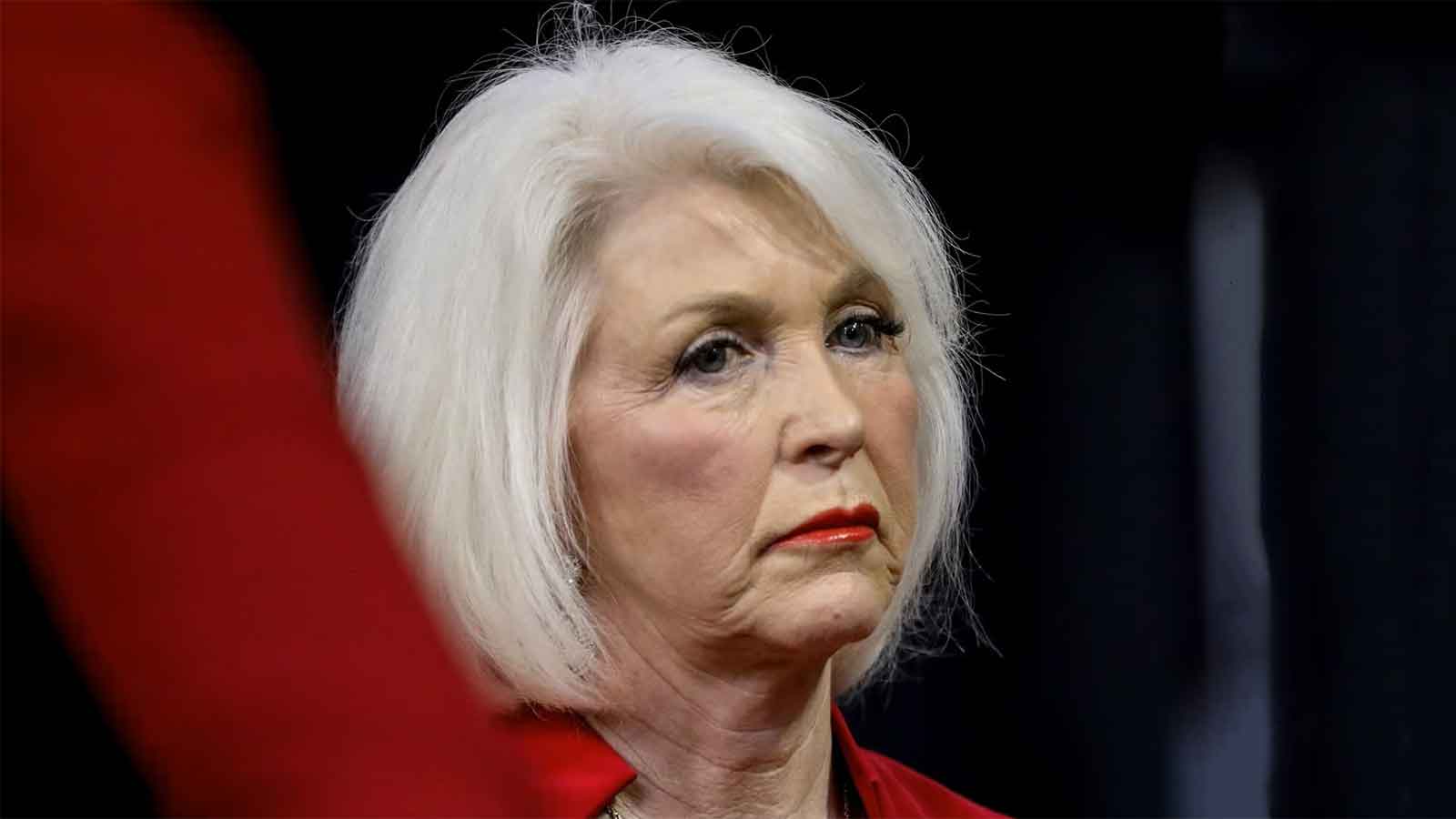Convicted Colorado election clerk Tina Peters’ transfer to federal custody hinges on governor

Tina Peters, former Mesa County clerk, listens during her trial in Grand Junction, Colorado. Credit-Colorado Sun
Colorado state officials and the Colorado County Clerks Association are asking Gov. Jared Polis to deny a request that would transfer former Mesa County Clerk and Recorder Tina Peters from the custody of the Colorado Department of Corrections to federal custody.
Peters is an election denialist who was convicted on charges related to allowing unauthorized access to a voting machine in 2022. Since then, her case has garnered national attention as her supporters push for her release.
On Sunday, President Trump, in a post on Truth Social, reignited calls for her release, writing, “FREE TINA PETERS, WHO SITS IN A COLORADO PRISON, DYING & OLD, FOR ATTEMPTING TO EXPOSE VOTER FRAUD IN THE RIGGED 2020 PRESIDENTIAL ELECTION!!!”
Now, the Federal Bureau of Prisons has requested that the Colorado Department of Corrections transfer Peters into federal custody. The move drew sharp criticism from the bipartisan Colorado County Clerks Association and state officials, who argue the transfer request would bow to political pressure and circumvent the law.
Recently, Colorado Secretary of State Jena Griswold asked the governor to deny the request, encouraging Polis to “uphold the authority of Colorado courts and Colorado law.”
She asserted, “Tina Peters stands alone as an example of the nefarious actions and outcomes of election denialism. Her deliberate and criminal actions were perpetrated in support of Donald Trump’s “Big Lie.” She violated Colorado law and her duty to administer Mesa County elections. She was found guilty of her crimes by a jury of her peers, after an extensive trial. Peters is serving her sentence in state prison for state crimes that harmed her community and violated the trust placed in her office. She is incarcerated because she broke Colorado law.”
The Colorado County Clerks Association echoed Griswold’s sentiments and said that the transfer would endanger clerks across the country who are already facing an increase in threats and intimidation.
“The risks to these public servants would only grow if she were allowed to use a new legal narrative to further these falsehoods. These election professionals stood up for the law, for the truth, and for the voters of Colorado. In return, they endured fear for their safety and reputational attacks that continue even today,” the association argued. “To remove Ms. Peters from Colorado custody now, at the urging of political actors outside our state, would send a deeply damaging message to the clerks who upheld their oath under extraordinarily difficult circumstances. It would imply that accountability for violations of Colorado law can be negotiated or avoided, while those who acted honorably were left to face the consequences alone. It would also undermine the work of Colorado’s prosecutors, jurors, and judicial system, each of whom fulfilled their responsibilities thoroughly and independently.”
Denver Clerk and Recorder Paul López said that the transfer would be “a betrayal to the thousands of bipartisan elections workers who, despite threats and intimidation, continue to put country before party.”
Peters was convicted in October 2024 on charges of attempting to influence a public servant, conspiracy to commit criminal impersonation, first-degree official misconduct, violation of duty and failing to comply with Colorado’s Secretary of State. The charges stemmed from Peters allowing a county security card to be misused and giving a man access to the Mesa County election system in May 2021.
Peters’ former chief deputy clerk, Belinda Knisley, and former county clerk’s office employee, Sandra Brown, took plea deals in 2022 for their part in the investigation. As part of her plea deal, Knisley was required to testify against Peters. Prosecutors said Knisley obtained the badge for the man, whom Peters said she was hiring in the clerk’s office.
During her sentencing, the judge admonished Peters, stating she did not show remorse for her actions. He sentenced her to nine years of incarceration.
In February, Peters requested that she be released on bail while she appeals her conviction, citing major health concerns. The application said she has suffered a recurrence of lung cancer, fibromyalgia, and physical and mental deterioration while in custody.
In a controversial move, the Department of Justice announced that it will review her case in March. Acting U.S. Assistant Attorney General Yaakov M. Roth said her sentence is “exceptionally lengthy” and that there are concerns over Peters’ prosecution.
Polis has not said if he plans to approve Peters’ transfer, and it’s unclear why the Federal Bureau of Prisons has requested her transfer to federal custody.



